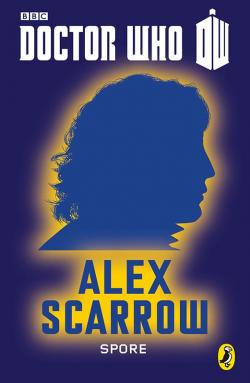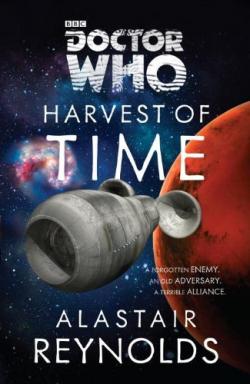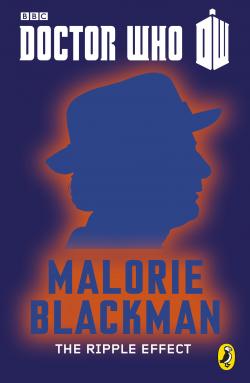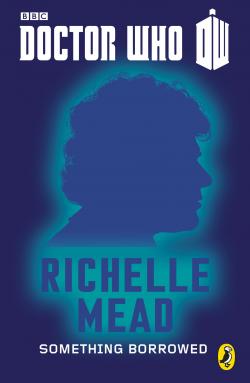Spore (Puffin Books)
Sunday, 25 August 2013 - Reviewed by Matt Hills
This review contains plot spoilers and is based on the UK edition of the ebook.
This is an effective short story which builds tension smartly and offers an interesting pay-off. But as a tribute to the era of the eighth Doctor it falls a little flat. Beyond details of his costume, this is barely recognizable as the Paul McGann Doctor, instead feeling very generically ‘Doctor-ish’ rather than resonating with this incarnation’s appearance in the TV Movie or indeed with any of his lives beyond television. Also, the Doctor is depicted as travelling alone, meaning that none of his TV, novel or audio companions are acknowledged. All of this makes Spore a rather pale shadow of earlier entries in this series, for example Philip Reeve’s Roots of Evil, which perfectly captured the spirit of its Doctor Who time. However, nor is this eshort comparable to Eoin Colfer’s opening story which actively reworked the first Doctor’s character – this isn’t so much a revisionist eighth Doctor as a reduced or thinned-out character denuded of distinguishing features.
More authorial energy has been expended by Alex Scarrow on realizing the Doctor’s opponent – the spore of the title which threatens the American town of Fort Casey. This organism breaks any living matter down into a black sludge which it can then use to create a network of biomass connections and defences. However, the alien pathogen isn’t simply intent on invasion: it has a further purpose which Scarrow gradually reveals, and which sets the stage for an intriguing denouement. And there’s also some back-story to cement the Doctor’s involvement, as it becomes apparent that this entity has been faced by the Time Lords before. As a plot device this feels slightly in danger of becoming a Who cliché, mind you: it offers an instant way of raising the stakes, and the Time Lords have had a motley collection of enemies and invaders over the years. But Scarrow’s decision to pit the US military against a creature previously encountered by Gallifreyans means that the Doctor can play a more intimate role in repelling the spore than might otherwise have been the case.
Given that he’s travelling by himself, the Doctor rapidly acquires a makeshift companion, Evelyn Chan, part of the US forces sent in to investigate events in Nevada. By name-checking UNIT the Doctor gets himself sent in as a troubleshooter, and works alongside Evelyn to discover how the alien creature can be tackled. But Chan is given little sense of fleshed-out characterisation, and in an eshort such as this, which needs to constantly keep hitting plot beats, there is precious little space to develop her as a rounded, three-dimensional figure. Consequently she ends up as a companion cipher, there to give the Doctor somebody to talk to. Perhaps this tale would have worked better as an equivalent to The Deadly Assassin, pitting companion-less Time Lord against unusual antagonist.
There’s an interesting moment where cosmic timing is discussed: had the creature arrived on Earth some years later then the Doctor realizes a very different outcome would have arisen. It’s tempting to wonder if Scarrow is smuggling in a reference to the TV Movie’s fate: in 1996 Doctor Who’s timing was off, and just a few years later it would meet with a radically different outcome... but the parallel isn’t really made strongly or playfully enough to hold water.
Unlike last month’s Puffin ebook, Malorie Blackman’s magnificent and formula-challenging Ripple Effect, there’s little in the way of social commentary this time round. By contrast, this is an adventure firmly in the mould of B-movie antecedents, and although it darts along with plenty of narrative energy it ultimately feels rather insubstantial. The eighth Doctor has been poorly served in certain ways in the past (the TV Movie can hardly be described as having a well-plotted conclusion, for instance) and this strikes me, overall, as another disappointment. You get the feeling that Scarrow isn’t sure of what he should be building on from Doctor Who’s past, and his Doctor ends up feeling excessively generalised rather than specific.
It wouldn’t be fair to describe Spore as poor, however, but for me it is one of the weaker Puffin ebooks in this anniversary range. I expect the remaining titles will grab a much firmer hold of their source material, meaning that ninth, tenth and eleventh Doctors will most likely feel ‘authentic’ in a way that this eighth Doctor simply doesn’t. And although I realize the brief for this range was to use new authors, thereby reaching out to YA readers, perhaps the Paul McGann Doctor would have been better served by a writer who’d already established a feel for this incarnation across the “wilderness years” of the interregnum. Instead, Spore presents an oddly generic Doctor alongside an equally generic companion. The fact that it is starkly named in honour of its extraterrestrial invader shows in a single word where the story’s centre of gravity really lies.
And as rumours continue to circulate about who might have agreed to write for this series, it will be interesting to see which authors contribute to Puffin’s run of ‘new Who’ adventures…
This is an effective short story which builds tension smartly and offers an interesting pay-off. But as a tribute to the era of the eighth Doctor it falls a little flat. Beyond details of his costume, this is barely recognizable as the Paul McGann Doctor, instead feeling very generically ‘Doctor-ish’ rather than resonating with this incarnation’s appearance in the TV Movie or indeed with any of his lives beyond television. Also, the Doctor is depicted as travelling alone, meaning that none of his TV, novel or audio companions are acknowledged. All of this makes Spore a rather pale shadow of earlier entries in this series, for example Philip Reeve’s Roots of Evil, which perfectly captured the spirit of its Doctor Who time. However, nor is this eshort comparable to Eoin Colfer’s opening story which actively reworked the first Doctor’s character – this isn’t so much a revisionist eighth Doctor as a reduced or thinned-out character denuded of distinguishing features.
More authorial energy has been expended by Alex Scarrow on realizing the Doctor’s opponent – the spore of the title which threatens the American town of Fort Casey. This organism breaks any living matter down into a black sludge which it can then use to create a network of biomass connections and defences. However, the alien pathogen isn’t simply intent on invasion: it has a further purpose which Scarrow gradually reveals, and which sets the stage for an intriguing denouement. And there’s also some back-story to cement the Doctor’s involvement, as it becomes apparent that this entity has been faced by the Time Lords before. As a plot device this feels slightly in danger of becoming a Who cliché, mind you: it offers an instant way of raising the stakes, and the Time Lords have had a motley collection of enemies and invaders over the years. But Scarrow’s decision to pit the US military against a creature previously encountered by Gallifreyans means that the Doctor can play a more intimate role in repelling the spore than might otherwise have been the case.
Given that he’s travelling by himself, the Doctor rapidly acquires a makeshift companion, Evelyn Chan, part of the US forces sent in to investigate events in Nevada. By name-checking UNIT the Doctor gets himself sent in as a troubleshooter, and works alongside Evelyn to discover how the alien creature can be tackled. But Chan is given little sense of fleshed-out characterisation, and in an eshort such as this, which needs to constantly keep hitting plot beats, there is precious little space to develop her as a rounded, three-dimensional figure. Consequently she ends up as a companion cipher, there to give the Doctor somebody to talk to. Perhaps this tale would have worked better as an equivalent to The Deadly Assassin, pitting companion-less Time Lord against unusual antagonist.
There’s an interesting moment where cosmic timing is discussed: had the creature arrived on Earth some years later then the Doctor realizes a very different outcome would have arisen. It’s tempting to wonder if Scarrow is smuggling in a reference to the TV Movie’s fate: in 1996 Doctor Who’s timing was off, and just a few years later it would meet with a radically different outcome... but the parallel isn’t really made strongly or playfully enough to hold water.
Unlike last month’s Puffin ebook, Malorie Blackman’s magnificent and formula-challenging Ripple Effect, there’s little in the way of social commentary this time round. By contrast, this is an adventure firmly in the mould of B-movie antecedents, and although it darts along with plenty of narrative energy it ultimately feels rather insubstantial. The eighth Doctor has been poorly served in certain ways in the past (the TV Movie can hardly be described as having a well-plotted conclusion, for instance) and this strikes me, overall, as another disappointment. You get the feeling that Scarrow isn’t sure of what he should be building on from Doctor Who’s past, and his Doctor ends up feeling excessively generalised rather than specific.
It wouldn’t be fair to describe Spore as poor, however, but for me it is one of the weaker Puffin ebooks in this anniversary range. I expect the remaining titles will grab a much firmer hold of their source material, meaning that ninth, tenth and eleventh Doctors will most likely feel ‘authentic’ in a way that this eighth Doctor simply doesn’t. And although I realize the brief for this range was to use new authors, thereby reaching out to YA readers, perhaps the Paul McGann Doctor would have been better served by a writer who’d already established a feel for this incarnation across the “wilderness years” of the interregnum. Instead, Spore presents an oddly generic Doctor alongside an equally generic companion. The fact that it is starkly named in honour of its extraterrestrial invader shows in a single word where the story’s centre of gravity really lies.
And as rumours continue to circulate about who might have agreed to write for this series, it will be interesting to see which authors contribute to Puffin’s run of ‘new Who’ adventures…













